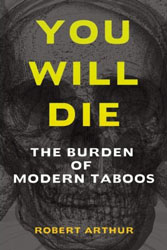Posted: October 5th, 2011 | Filed under: addiction, alcohol, amphetamine, cocaine, drugs, gambling, marijuana, tobacco | 2 Comments »
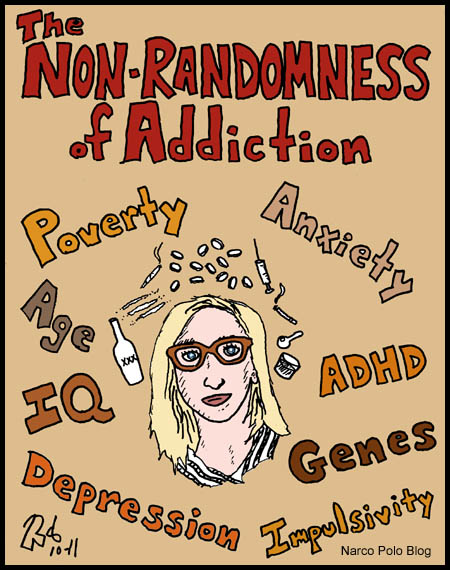
A tenet of the drug war is that drug X is so pleasurable that once tried, most people cannot resist it. There is no way of knowing if you have the “disease” of lifelong addiction to drug X, therefore no one should ever try drug X. All of this is wrong.
The vast majority of people who try drugs do not go on to become addicted (1, 9), and those that do tend to share certain characteristics and conditions. Here are some of the things that predispose people to addiction:
Other Addictions
If a person has not been able to exercise self-control with one source of pleasure, it is more likely he or she will not be able to exercise self-control with another source of pleasure. As can be seen in the following chart, someone diagnosed with a cocaine dependence is 6.64 times more likely than someone without a cocaine dependence to develop a dependence to alcohol.
 (6)
(6)
This overindulgence is not reserved to drugs as demonstrated by the considerable overlap of drug addictions and behavioral addictions. Note that the percentage of the general population that has ever experienced substance use disorders is 14.6%. (5)
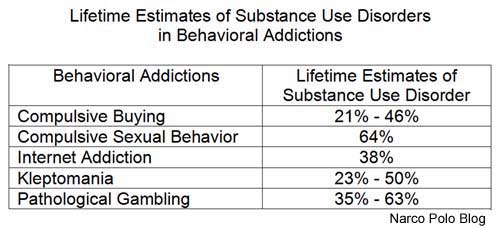 (2)
(2)
Although overlap with food addiction is complicated by drugs’ effects on weight (e.g. cigarettes and stimulants suppress appetites), 32.6% of weight-loss surgery candidates have experienced substance use disorders. (4)
Poverty
Surveys of drinking have long found that despite being more likely to abstain, those from lower socioeconomic groups are still “much more often” problem drinkers. (10, p. 160) A more recent study has found income serves as a predictor for more than just alcohol dependence. As seen below, people in the poorest income bracket are almost three times as likely to become dependent on cocaine as those in the wealthiest bracket.
 (6)
(6)
Mental Health Issues
People with mental health issues are more likely than their peers to become addicted to substances. As can be seen below those diagnosed with ADHD or a personality disorder are three times as likely to become dependent on alcohol.
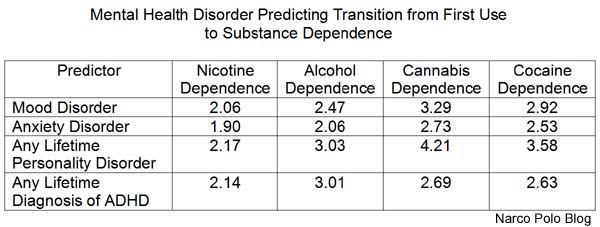 (6)
(6)
Lower Intelligence
Heavy drug users frequently score lower on cognitive tests than their peers. This has been used to say drugs lower intelligence. In the early 2000s two twin studies disproved this idea. In these studies one twin had a history of drug abuse and the other did not. Neither study found a correlation between cognitive performance and amount of drug use. The studied drugs were marijuana, cocaine, and amphetamine. Lower cognitive abilities lead to heavy drug use, not vice versa. (3, pp. 150-152)
Genes
An adoption study has shown that the biological father’s drinking patterns predict a son’s alcoholism, while the adoptive father’s does not. Boys whose biological fathers were severe alcoholics had an alcoholism rate of 18% with an alcoholic adoptive father, 17% with an adoptive home free of parental alcoholism. A study of twins found shared genes did not correlate with experimentation with illicit drugs, but if an identical twin was dependent there was a 40% chance the twin was also dependent. (3, p. 92)
Addictive Personality
People with substance use disorders, just like people with behavioral addictions, score high on self-report measures for sensation-seeking and impulsivity, and low for harm avoidance. (2) This is not surprising. An addict is arguably someone who chooses the sensation an activity provides at levels that are harmful. The choice is influenced by his or her impulsivity, i.e. the tendency to act without weighing the future consequences of one’s actions. The pleasure an addictive behavior provides is immediate whereas the pleasure of moderation is often distant and abstract (e.g. long-term health, more stable work/family life).
Youth
Not only are older people much less likely to become dependent on something, they are also more likely to end dependencies. The vast majority of addicts “mature out” of their addictions and most of them accomplish this without treatment. (11, p. 13) Maturing out is so pervasive that a national 2010 survey found that only .1% of people 65 or older had abused or been dependent on an illegal substance in the past year. The highest level was reached by 19-year-olds (9.3%) from which the number decreased with each ensuing age category. (8)
 (6)
(6)
In line with this, addictive personalities weaken over time. Older adults report being less impulsive, sensation-seeking, and risk tolerant than their younger peers. (12)
Conclusion
Addiction is an intense involvement people fall into for solace when they cannot find better gratifications in the rest of their lives. (11, p. 16) The escape provided by destructive behaviors is usually only appealing to those suffering from internal sources, e.g. mental health issues, or external sources, e.g. poverty. Addiction is a symptom of underlying problems. This helps explain why, contrary to the exhortations of America’s drug warriors, the legal status of drugs has been found to have “surprisingly little measurable consequence” on factors like addiction rates. (7, 3, p. 3) The locus of addiction lies in people, not substances.
Sources
1. Robert Arthur, You Will Die: The Burden of Modern Taboos, 3rd Ed. (2008), p. 330.
2. Jon Grant, et al., “Introduction to Behavioral Addictions,” American Journal of Drug and Alcohol Abuse, 36, 2010.
3. Gene Heyman, Addiction: A Disorder of Choice (2009).
4. Melissa Kalarchian, et al., “Psychiatric Disorders Among Bariatric Surgery Candidates,” American Journal of Psychiatry, Feb. 2007. LINK
5. Ronald Kessler, et al., “Lifetime Prevalence and Age-of-Onset Distributions of DSM-IV Disorders in the National Comorbidity Survey Replication,” Archives of General Psychiatry, 62, 2005.
6. Catalina Lopez-Quintero, et al., “Probability and Predictors of Transition from First Use to Dependence ….,” Drug and Alcohol Dependence, 115, 2011.
7. Robert MacCoun and Peter Reuter, Drug War Heresies (2001), pp. 236-237.
8. “National Survey on Drug Use and Health,” Fig. 5.3B, Substance Abuse and Mental Health Services Administration (SAMHSA), 2010. LINK
9. Frank Owen, No Speed Limit (2007), p. 48.
10. Stanton Peele, Diseasing of America (1995), p. 160.
11. Stanton Peele, Seven Tools to Beat Addiction (2004).
12. D.R. Roalf, et al., “Risk, Reward, and Economic Decision Making in Aging,” Journals of Gerontology, 6 Sep. 2011. LINK
Posted: August 7th, 2011 | Filed under: gambling | 5 Comments »
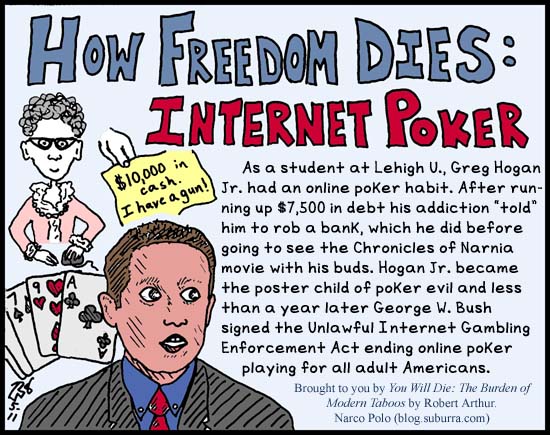
In the early ’00s I lived next door to a retired elderly woman in a quiet town outside of Harrisburg, Pennsylvania. Every evening she enjoyed playing poker online. As it did for millions of others, online poker gave her pleasure. Of course, elderly women finding happiness in their final days have never been the face of internet gambling. In 2006 that face belonged to Greg Hogan Jr.
Aspiring Mogul Will Write History
The New York Times article that introduced Hogan Jr. to the world presented him as an angelic son of a Baptist minister and a nurse. A virtuoso pianist, Hogan Jr., “was like a boat on a still pond – one small push from his parents and he’d glide on toward the goal.” (10) He was also an ambitious Young Republican who revered Reaganomics and wanted to become a financial mogul. His senior yearbook quote was, “History will be kind to me, for I intend to write it.” (1)
On his first day at Lehigh University in Bethlehem, Pennsylvania, Hogan Jr. decided to run for class president. At Lehigh he would attain that goal, but he would also be introduced to poker. Hogan Jr. met a fellow student who had lost $100 playing on the internet and another student who won over $150,000. Undeterred by the loser, Hogan Jr. opened an online account with $75. As the New York Times author wrote chillingly, “the effect [of playing] was paralyzing, narcotic.”
Poker is a game of skill (9), and the golden boy from the Cleveland suburbs turned out to be a horrible player with no discipline. Not only was he going to write history but he was also going to write new rules for poker, “I practiced by playing, but I really didn’t do my homework. I didn’t read books on how to play. I was going to develop my own style, play my own way. I was arrogant.” (1)
He kept losing and kept adding to his account. Even though his parents took away his house computers, put anti-gambling site software on his school computer, and forced him to attend Gamblers Anonymous it was too late. As one journalist wrote, “Greg Jr. wanted to obey his father, but by then he was captive to his addiction.” (1) He soon had gone through $7,500 from loans from friends, book money for school, and summer earnings. The figure would have been even higher if his parents had not thwarted him from duping his grandma into giving him $1,000 for an “orchestra trip.”
That’s Really Stupid, Son
When scapegoating, sensationalism, and morality combine, all it takes is one person to do something preposterously stupid for politicians to outlaw an activity for everyone. For internet gambling this person would be Greg Hogan Jr. On December 9, 2005, Lehigh University Sophomore Class President Greg Hogan Jr. went to see The Chronicles of Narnia movie with Vice President Matt Montgomery and Senate President Kip Wallen. Beforehand Wallen dropped Hogan Jr. off at a Wachovia bank in his black Ford Explorer. Hogan Jr. went in and handed a note to a cashier that read, “I want $10,000 in cash. I have a gun! Be quiet and quick, or I will shoot. No bait.” (1) The cashier understandably gave him a look of “seriously?” but he told her it was real so she gave him $2,871.
Hogan Jr. went back out to the Explorer and drove off for the movie and a pizza. Later that day his fraternity house, Sigma Phi Epsilon, was raided by police but he wasn’t present so they arrested him at orchestra practice. Hogan Jr.’s breathtakingly asinine act would turn him into a celebrity. His lawyer was fielding calls from shows such as Oprah and Good Morning America. He would get a full article in the New York Times.
The Addiction Told Me To Rob A Bank
Evangelical Christians led the first charge to criminalize gambling in America in the 1820s, and it was the Baptists, Gary Hogan Jr. and Gary Hogan Sr., that would lead conservative Christians to internet victory in the 2000s. There would be three ingredients:
1. Scapegoating – On Good Morning America Hogan Jr. said of his crime, “Basically, the addiction told me to do it.” (4)
2. Sensationalism – Hogan Sr. testified before the Financial Services Committee of the House of Representatives that allowing any type of online gambling would be like letting kids play Russian Roulette. He closed by saying “Some dads do not know where their children are today, and other dads have had to bury them because Internet Gambling left them only with the choice of suicide.” (6)
3. Morality – If you question whether morality plays a part in how this unfolded, imagine the reaction if one of the thousands of teenagers who run up similarly high credit card debts via irresponsible shopping did this. Would anybody call for credit cards to be criminalized for everyone? The mothers of two Oklahoma college students who committed suicide because of their credit card debts could not even get Oklahoma legislators to limit on-campus credit card solicitations. (5)
Hogan Jr. robbed a bank on December 9, 2005. The Unlawful Internet Gambling Enforcement Act was signed by President George W. Bush on October 13, 2006.
Hypocrisy:
In 2010 in Bethlehem, Pennsylvania, the same town of Hogan Jr.’s robbery, a woman was charged with stealing $68,500 from her employer “to fuel her addiction to scratch-off lottery tickets.” (7) There was no response by Congress to outlaw state-run lotteries.
Note: The amount of money online poker sites take from players (the rake) is usually around 1-5% of the money played. (11) The amount of money state-run lotteries took from players in 2006 was 35% of the money played. (8)
Costly Hypocrisy:
America’s hypocrisy of allowing domestic online lotteries and horse betting, but not allowing foreign poker sites was found by the World Trade Organization to be in violation of its international trade agreements. Because of this the US had to settle complaints by Japan, Europe, and Canada. The settlements were not made public on the ridiculous basis of “national security interests,” but they are believed to be in the tens of billions of dollars. (2)
Non-Sensational End Quotes:
“The overall rate of problem gambling in the UK remained unchanged between 1999 and 2007, despite the rise (and legalization) of Internet wagering.” (12)
“The current available evidence suggests that the rate of PG (pathological gambling) has remained relatively stable [in the United States] during the past 35 years despite an unprecedented increase in opportunities and access to gambling.” (3)
To learn why go here.
To follow the ongoing follies of America’s War on Gambling check out Reason magazine’s Gambling page. To join the fight to end this war go to the Poker Players Alliance website.
Sources:
1. Matt Assad, “How Online Gambling Toppled Greg Hogan’s World,” Morning Call, 17 Aug. 2006. LINK
2. Radley Balko, “Internet Gambling Ban,” Reason, 3 Jan. 2008. LINK
3. Steve Chapman, “The Real Effects of Gambling,” Reason, 21 July 2011. LINK
4. Chris Cuomo, “Student Says He Was Driven to Crime by Gambling Addiction,” Good Morning America, 25 July 2006. LINK
5. Molly Hennessy-Fiske, “Maxed Out,” Los Angeles Times, 16 Mar. 2007. LINK
6. Gregory Hogan, “A Father’s Journey ….,” U.S. House of Representatives, 8 June 2007. LINK
7. Pamela Lehman, “‘Destroyed’ by Addiction,” Morning Call, 28 Apr. 2010. LINK
8. “Lottery Payouts and State Revenue,” National Conference of State Legislatures, Dec. 2008. LINK
9. “Poker-Faced,” Economist, 19 May 2011. LINK
10. Mattathias Schwartz, “The Hold-‘Em Holdup,” New York Times, 11 June 2006. LINK
11. Dave Shoelace, “The Perks of Online Poker: Rakeback,” Card Player, 30 Nov. 2008. LINK
12. Jacob Sullum, “The Addict’s Veto,” Reason, 21 Nov. 2007. LINK
Posted: November 7th, 2007 | Filed under: drugs, federalism, gambling, marijuana, pornography | Comments Off on The United State of America
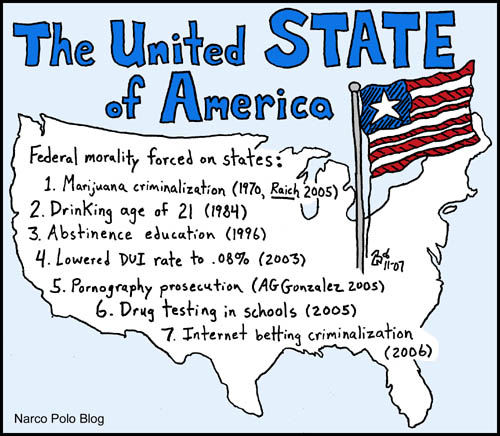
1. For more information on the 2005 Supreme Court ruling, Raich v. Ashcroft, that allowed federal prosecution of marijuana possession even where legal under state law see the following guide at Drug WarRant. As Justice Clarence Thomas said in his dissent, this ruling established that “the Federal Government is no longer one of limited and enumerated powers.” In other words, the federal government has swallowed the Constitution.
2. A 2007 MSNBC article on how people are recognizing the unintended consequences of the federally enforced drinking age can be found here.
3. Since 1996 the federal government has given states money for the exclusive purpose of teaching the social, psychological, and health gains to be realized by completely abstaining from sexual activity. In fiscal year 2006 the federal government spent over $200 million on abstinence only education. (You Will Die, p. 141.)
4. To read about how the federally forced .08% BAC level for criminal liability was neo-prohibitionist hokum see this PDF article, “The Anti-Drunk Driving Campaign: A Covert War Against Drinking,” hosted at RIDL.us.
5. In 2005, Attorney General Alberto Gonzalez, declared that fighting pornography (of consenting adults for consenting adults) would be one of his top priorities and created a new anti-obscenity squad in the FBI. Thanks to ViceSquad for this comical link that shows mainstream pornography will remain a priority.
6. For information on school drug testing’s propaganda see “Let the Love Flow” and for information on its ineffectiveness see “Pee Tests.” Both are from Jacob Sullum at Reason.com.
7. The words of Rep. Barney Frank spoken in vain before the passage of the the Unlawful Internet Gambling Enforcement Act of 2006 can be found here.

 (6)
(6) (2)
(2) (6)
(6) (6)
(6) (6)
(6)


